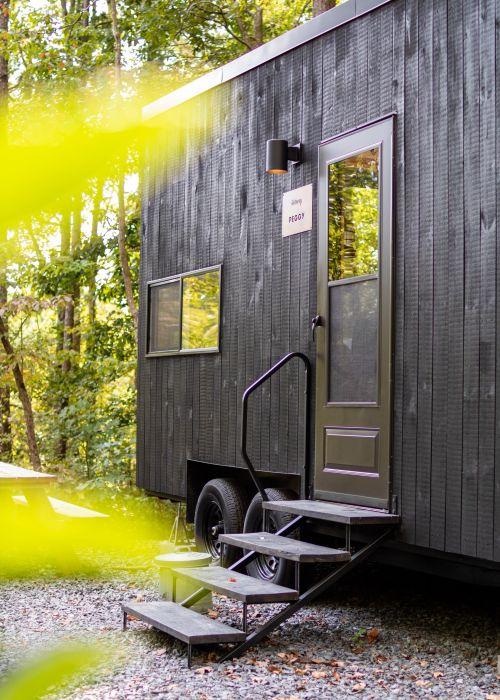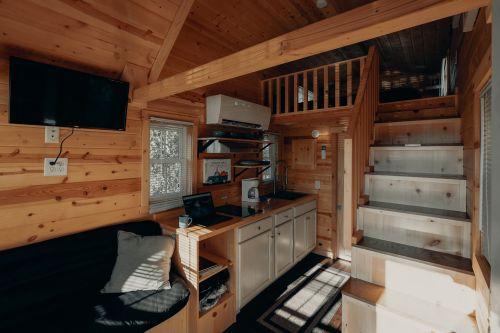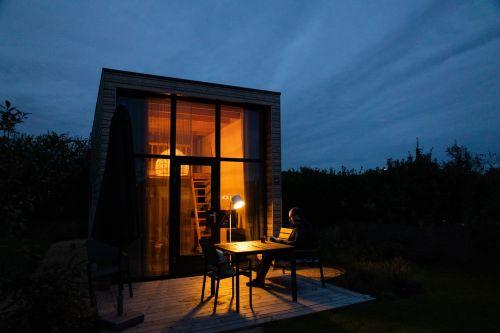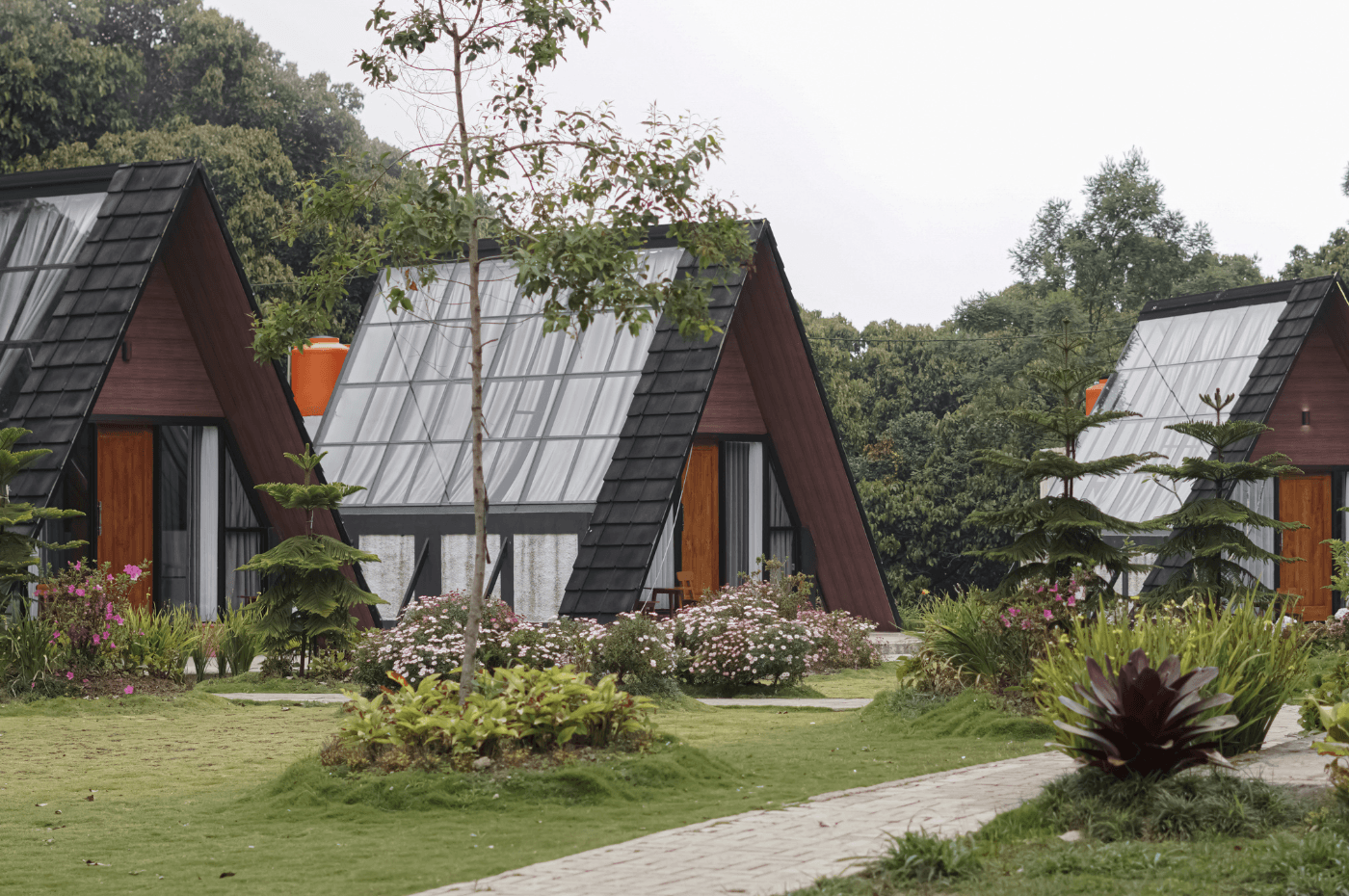Tiny houses are capturing the interest of more and more Quebecers who are seeking greater freedom, lower costs, and a reduced ecological footprint. While the concept is certainly appealing on paper, turning that dream into reality in Quebec is often more complicated than it seems.
The main challenge? Municipal regulations, which are often restrictive and act as a major barrier to setting up tiny houses in many regions. From minimum size requirements to foundation rules and municipal hesitation toward a still-marginal housing model, finding a legally compliant location to install a tiny house isn’t always easy.
In this article, we explore the key regulations to know, which cities are open to this type of housing, and the various projects underway across the province. Whether you're planning to live in a tiny house year-round or purchase a mini cottage, here's what you need to know before moving forward with your project in Quebec.
Can you install a tiny house on your own land in Quebec?
The possibility of placing a tiny house on your property depends entirely on where that land is located. In Quebec, each municipality sets its own urban planning and zoning bylaws and some are much more receptive than others when it comes to alternative housing.
In many cases, the regulations currently in place outright prevent the installation of a tiny house, due to factors like minimum dwelling size, required foundation types, or zoning restrictions that limit residential use in certain areas.
That said, the tide is beginnihg to turn. With growing public interest in tiny homes, more and more municipalities are reviewing their existing regulations to better define and sometimes encourage, their integration into the community. It’s likely that the legal framework will continue to evolve in a more favourable direction over the coming years.
Mini and micro Homes: what the law says in Quebec
In Quebec, several regulatory standards currently limit the ability to install a tiny house just anywhere. Before launching your project, it’s crucial to understand the key legal constraints that apply to these types of properties. Here are the three main rules currently in effect:
-
Homes under 700 square feet are not covered by Quebec’s National Building Code, making it harder for municipalities to approve them.
-
It is prohibited to build a studio smaller than 275 square feet or a one-bedroom single-family home smaller than 320 square feet.
-
Tiny houses used as secondary dwellings (such as an additional unit on a lot that already has a principal residence) are generally not permitted.
In practice, many tiny homes don’t meet these standards. However, municipalities do have some flexibility to adjust their urban planning rules, particularly regarding the minimum required size for residential construction.

Which municipalities in Quebec allow neighbourhoods exclusively for tiny houses?
Some Quebec municipalities have shown strong support for integrating tiny houses by approving the development of dedicated neighbourhoods exclusively for this type of housing. This model offers several advantages: greater regulatory flexibility, a cohesive sense of community, and the promotion of innovative living concepts often focused on nature, energy efficiency, or minimalist lifestyles.
Here are a few examples of projects that are already in place:
-
Domaine Escapad in Adstock : A collection of tiny cottages nestled in nature, ideal for outdoor and tranquility lovers.
-
Domaine des Cantons in Saint-Étienne-de-Bolton : Designed for retirees looking to embrace a minimalist lifestyle.
-
Les Boisés de la Rivière Noire in Sainte-Émélie-de-l’Énergie : A project centred on eco-energy and sustainable development.
-
Cité Nature in Saint-Donat : Offers high-end tiny houses starting at 535 square feet, blending simplicity with refinement.
These specialized developments are becoming increasingly common across the province, each exploring how tiny homes can find their place in Quebec’s residential landscape.
| Municipality | Number of lots available |
| Témiscouata-sur-le-Lac | 10 lots with direct lake access |
| Saint-Nicéphore | 30 lots |
| Dixville | 6 lots (phase one) and 12 lots (phase two) |
| Farnham |
|
| Saint-Côme | Approx. 15 lots in the Domaine du Manoir |
| Saint-Donat | 22 lots in the Refuge Éco Nature |
| Sainte-Marguerite-du-Lac-Masson | 200 lots (between 300 and 800 sq. ft.) |
| Chertsey |
|
| Saint-André-Avellin | 45 lots (minimum surface of 650 sq. ft.) |

Which cities in Quebec allow tiny houses throughout their entire territory?
While some municipalities restrict tiny houses to designated neighbourhoods or specific development projects, others go further by permitting their installation across the entire municipality, provided certain conditions are met.
These cities don’t enforce exclusive zoning for tiny houses but instead regulate their construction and placement through specific standards, usually related to minimum square footage, foundation type, and architectural appearance.
In most cases, municipalities require tiny homes to be installed on permanent foundations, such as slab-on-grade or pier systems. The main restrictions typically involve minimum habitable space, and sometimes the width of the front façade or overall dimensions.
Here is an overview of several Quebec municipalities that allow tiny homes throughout their territory, along with their main requirements:
- Saint-Justine: Minimum surface area of 215 sq. ft., with a façade of at least 11.4 ft.
- Sainte-Béatrix: Surface area of between 480 sq. ft. and 592 sq. ft. depending on the area.
- Saint-Adrien: Minimum surface area of 350 sq. ft.
- Weedon: Surface area of between 269 sq. ft. and 538 sq. ft., with a façade of at least 14 ft.
- Saint-Isidore-de-Clifton: Minimum surface area of 484 sq. ft., with a façade of at least 22.9 ft.
- Kiamika: Surface area between 269 sq. ft. and 538 sq. ft.
- Lac-Sainte-Marie: Minimum surface area of 592 sq. ft.
- Bowman: Minimum surface area of 538 sq. ft.
- Ripon: Minimum surface area of 376 sq. ft. with a minimum width and depth of 19.6 x 13.45 ft.

Which cities allow tiny houses as backyard Accessory Dwelling Units (ADUs)?
In Quebec, installing a tiny house as an Accessory Dwelling Unit (ADU), a secondary home located on the same lot as a principal residence, is generally prohibited. However, some municipalities have started showing flexibility by adapting their zoning bylaws to reflect this emerging housing model.
Among the cities that allow tiny houses as ADUs, here are a few examples:
-
Québec City: Permits the installation of a tiny house as a backyard ADU under specific conditions.
-
Gatineau: Also accepts this type of dwelling as part of a gentle densification strategy.
-
Mont-Saint-Hilaire: Authorizes tiny houses as ADUs but imposes a specific condition: there must be a familial relationship between the residents of the tiny house and the owners of the main residence.
To explore all the projects and zoning areas where this type of dwelling is permitted, you can consult the interactive map created by the Mouvement québécois des mini-maisons.
How much does a prefabricated tiny house cost in Quebec?
The price of a tiny house can vary significantly depending on its size, layout, level of finish, and materials used. In general, you should expect to pay between $60,000 and $100,000 for a prefabricated tiny house. For a micro-house, which is even more compact, some models start at around $30,000 to $40,000.
It’s important to note that these prices do not include the cost of the land or other installation-related expenses, such as foundation work, utility connections, permits, landscaping, and more. Depending on the project, the total cost can rise quickly. Key price factors include living space, interior layout, material quality, and the level of energy autonomy you’re aiming for.
Do you have a real estate project ?
XpertSource.com can help you find a real estate broker. When you tell us about your project, we put you in touch with qualified resources for free. Simply fill out our form (it only takes a few minutes) and we will connect you with professionals.

